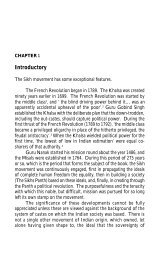The Sikh Turban: Post-911 Challenges to This Article of Faith
The Sikh Turban: Post-911 Challenges to This Article of Faith
The Sikh Turban: Post-911 Challenges to This Article of Faith
Create successful ePaper yourself
Turn your PDF publications into a flip-book with our unique Google optimized e-Paper software.
Boerne v. Flores, declared that RFRA was unconstitutional as applied <strong>to</strong> individual<br />
states. 327 However, it held that it is still applicable <strong>to</strong> First Amendment violations alleged<br />
against the federal government. 328<br />
In 2006, the Supreme Court may have marked an expansion <strong>of</strong> free exercise<br />
protection. In Gonzales v. O Centro Espirita Beneficente Uniado Do Vegetal, 329 a church<br />
that uses hallucinogenic tea in religious ceremonies claimed the enforcement <strong>of</strong> the<br />
Controlled Substances Act infringed on the church’s free exercise rights. <strong>The</strong> Court<br />
unanimously sided with the church, noting that the government must “demonstrate a<br />
compelling interest in uniform application <strong>of</strong> a particular program by <strong>of</strong>fering evidence<br />
that granting the requested religious accommodations would seriously compromise its<br />
ability <strong>to</strong> administer the program,” and rejecting the government’s “slippery-slope<br />
concerns that could be invoked in response <strong>to</strong> any RFRA claim for an exception <strong>to</strong> a<br />
generally applicable law,” namely, “If I make an exception for you, I’ll have <strong>to</strong> make one<br />
for everybody, so no exceptions.” 330 <strong>The</strong> Court indicated that a case-by-case approach <strong>to</strong><br />
evaluating exemptions <strong>to</strong> generally applicable religious laws was appropriate, 331 as was<br />
the case in the 2005 decision <strong>of</strong> Cutter v. Wilkinson. 332 Acknowledging that “there may<br />
be instances in which a need for uniformity precludes the recognition <strong>of</strong> exceptions <strong>to</strong><br />
generally applicable laws under RFRA,” the Court did not find that the Controlled<br />
Substances Act was immune from exemptions “given the longstanding exemption from<br />
the Controlled Substances Act for religious use <strong>of</strong> peyote, and the fact that the very<br />
reason Congress enacted RFRA was <strong>to</strong> respond <strong>to</strong> a decision denying a claimed right <strong>to</strong><br />
sacramental use <strong>of</strong> a controlled substance.” 333<br />
To the extent that the government may pass a ban on conspicuous articles <strong>of</strong> faith<br />
<strong>to</strong> promote secularity or a national identity, such an interest would likely not pass under<br />
Pierce v. Society <strong>of</strong> the Sisters <strong>of</strong> the Holy Names <strong>of</strong> Jesus and Mary, 334 which soundly<br />
327 City <strong>of</strong> Boerne v. Flores, 521 U.S. 507, 536 (1997).<br />
328 See Kikimura v. Hurley, 242 F.3d 950, 959 (10th Cir. 2001) (noting that “the<br />
separation <strong>of</strong> powers concerns expressed in Flores do not render RFRA unconstitutional<br />
as applied <strong>to</strong> the federal government” and that “when a portion <strong>of</strong> a statute is declared<br />
unconstitutional the constitutional portions <strong>of</strong> the statute are presumed severable”).<br />
329 Gonzales v. O Centro Espirita Beneficente Uniado Do Vegetal, 546 U.S. 418 (2006).<br />
330 Id. at 421.<br />
331 Id. at 436.<br />
332 Cutter v. Wilkinson, 544 U.S. 709, 724-26 (2005).<br />
333 Gonzales, 546 U.S. at 436.<br />
334 Pierce v. Society <strong>of</strong> the Sisters <strong>of</strong> the Holy Names <strong>of</strong> Jesus and Mary, 268 U.S. 510<br />
(1925).<br />
57
















